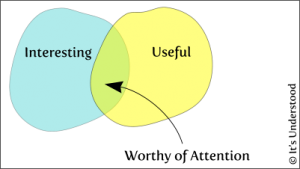by Andrew | Sep 14, 2010 | Build your own skills, Rants, Ramblings and Riddles |
Attention, focused and conscious thought, is a scarce resource. It requires effort and consumes energy – something our brains strive to minimize.
It’s further constrained by the number of waking hours we have. We only have so much time in which to express ourselves and do things that matter. Yet, without fail, a multitude of things manage to distract us from the things we really want to achieve.
In today’s “always on” environment these distractions seem to multiply and the opportunity to dilute our attention is usually only a click away. There are so many sources of practical advice on how to focus, from time management practices to “Getting Things Done” frameworks, that it seems we have no excuse to be distracted – but it happens.
How then to decide what to do? Here’s an interesting question to ask yourself before (or while) you disappear down a rabbit hole following a unplanned thread of activity: “Is this interesting or is this useful?”
I happen to be interested in many things and love to explore ideas and connections between them. My wife and business partner calls me an “info lush.” This is highly entertaining (for me) and sometimes yields useful discoveries or insights, yet it’s often dysfunctional in the broader context of life.
 What, then, is worthy of our attention? Or, more to the point, the attention of folks you want to help. Clearly the intersection of these two sets, the interesting and the useful, is where we should focus.
What, then, is worthy of our attention? Or, more to the point, the attention of folks you want to help. Clearly the intersection of these two sets, the interesting and the useful, is where we should focus.
I know it’s difficult at times to place ourselves on the “interesting versus useful” scale, but simply being mindful of the distinction and and asking the question can us help decide where to spend our most precious resource – our attention.
If we take this economic view, we can decide to spend our limited attention resource where it will have the greatest return. Isn’t that a worthy goal?
by Andrew | Sep 1, 2010 | Build your own skills, Rants, Ramblings and Riddles |
 If you’re like me, at least a little bit, you want to know why stuff works. I’ve a long history of pulling things apart to see what makes them tick. It’s just something I need to do. I can appreciate magic but I can’t help thinking of an explanation for the effect. Perhaps you do too.
If you’re like me, at least a little bit, you want to know why stuff works. I’ve a long history of pulling things apart to see what makes them tick. It’s just something I need to do. I can appreciate magic but I can’t help thinking of an explanation for the effect. Perhaps you do too.
That’s why I was initially a bit sceptical about coaching. I know there are lots of great true-to-life examples of coaching success, especially from the sports world. Which great Olympian doesn’t have a coach? And team sports just wouldn’t be the same or, perhaps exist, without the Coach alongside the players. So why the hesitation?
I just had to have a framework, some foundation, to understand why a coach isn’t simply an expensive nag. Well I found it when I started to explore the neuroscience-based approach taken by David Rock. He’s built on relatively recent discoveries about how our brains actually work to construct a coaching model and process that takes advantage of our innate behaviour to instill new thoughts and habits without undue pain and stress.
(more…)
by Susan Johnston | Jan 5, 2008 | Rants, Ramblings and Riddles |

One of my intentions for 2008 is to stop reading the comments after stories in the online version of the Globe & Mail, our national newspaper. They showcase uninspired and uninspiring nonsense posted by people who seem, with a few exceptions, to be ill-informed, ethnocentric, regionally oriented and partisan conspiracy theorists hiding behind anonymity. The outpouring of ignorance and intolerance is especially disturbing because these creatures are my fellow citizens. The news is bad enough; witnessing people at their least charitable makes it even worse.
(more…)
by Susan Johnston | May 22, 2007 | Rants, Ramblings and Riddles |

Here’s Part 2 of the condensed version of the arguments supporting giving face-to-face communication more attention. They are extracted from Real Conversation – the most powerful business tool your organization will ever use, my presentation at the recent Ragan Corporate Communications Conference.
Brain scientists speak: “Humans have to talk!”
Developments in neuroscience are showing us that conversation has tangible physical effects on us as human
beings.
In an era where people are paid to think, it’s probably no coincidence that there’s a lot of research examining how our brains work. Using new tools, graduate students everywhere are hooking folks up to functional MRIs to see which parts of their brains light up when they do or think
about various things.
There’s evidence that we’re genetically “hardwired” to communicate face-to-face. Moreover, we actually need the company of other humans. It keeps us
human.
(more…)
by Susan Johnston | Feb 21, 2007 | Rants, Ramblings and Riddles |

It’s hard to be a Help Desk person. We customers only call when we’re angry or confused or both. If only we could just learn to enjoy:
- waiting (Kenny G is Top Of The Pops on “Hold” this week)
- listening to long multilingual messages that don’t make sense in any language
- bouncing between service people (I suspect they have a [Random] button to send us to other departments where we will hear, “That’s not my job,” immediately before they ask the obligatory question, “Is there anything more I help you with today?”)
- getting nowhere and taking forever to get there
In a bid to be the “ideal customer,” I have started to use my problems as entertainment, for both myself and Help Desk employees. I had a great chat, this morning, with someone at Bell Canada. He was wonderful and had the customer service spirit so often missing in call centres.
(more…)
by Susan Johnston | Oct 20, 2006 | Rants, Ramblings and Riddles |
 I have a lovely telephone company. Through the magic of mergers, it’s also my mobile phone company, my Internet service provider and (if I had a TV) my cable company. Multiple services mean multiple reasons to contact its customer service line.
I have a lovely telephone company. Through the magic of mergers, it’s also my mobile phone company, my Internet service provider and (if I had a TV) my cable company. Multiple services mean multiple reasons to contact its customer service line.
And there the loveliness ends. The organization that enables me to communicate with you and the rest of the universe seems intent on preventing customers from communicating with its helpful help desk.
Place a call to the customer care line and you’re connected with an interactive voice response system (IVR). In other words, a fake guy, with an incessantly cheerful recorded voice tries to guess why you’re calling. Our IVR Guy has advanced beyond the “Press 1 for billing enquiries” stage and saves you the digital wear and tear of button pushing. All you have to do is speak the right words.
Pray the situation fits the options offered. Unless he hears the magic words, this poor man apologizes. “I’m sorry,” he says, “I must
have misunderstood. Can you repeat that please?” Welcome to Canada, where even our robots are polite.
Outwitting the robot – Since there’s no
officially sanctioned way to bypass IVR Guy, getting to a real person requires creativity, if not cunning.
(more…)
 What, then, is worthy of our attention? Or, more to the point, the attention of folks you want to help. Clearly the intersection of these two sets, the interesting and the useful, is where we should focus.
What, then, is worthy of our attention? Or, more to the point, the attention of folks you want to help. Clearly the intersection of these two sets, the interesting and the useful, is where we should focus.




